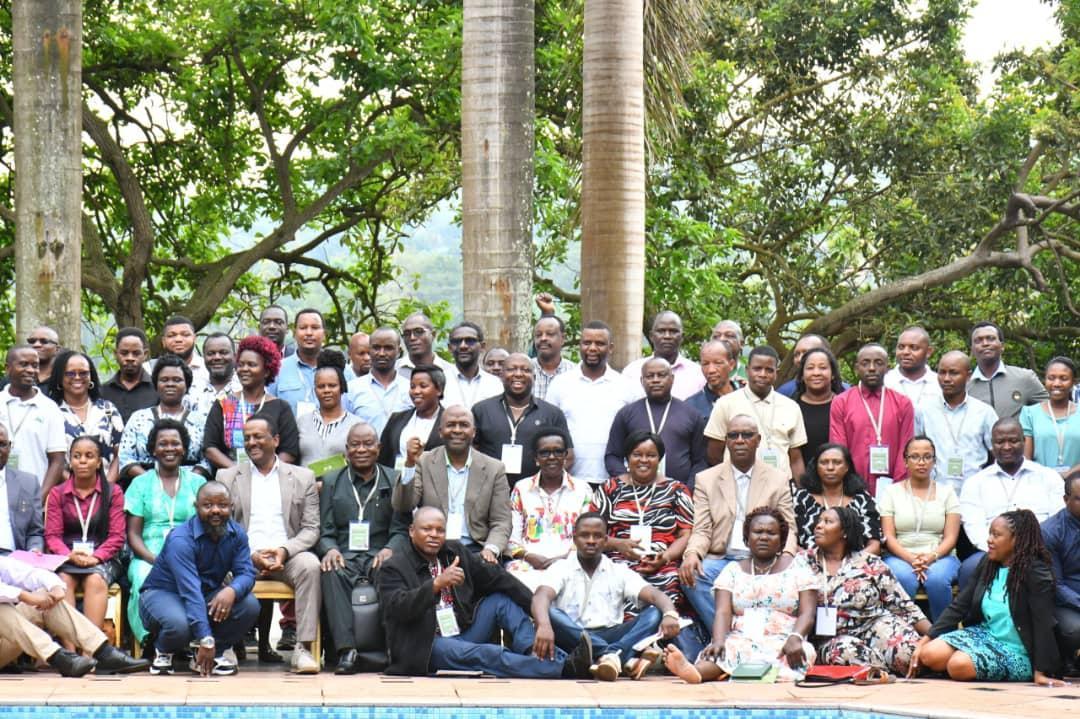Africa-Press – Uganda. Smallholder farmers, traders, civil society organisations, and policymakers from across East Africa have gathered in Jinja to chart a new course for regional trade grounded in justice, sustainability, and ecological integrity.
Through what they termed as the Jinja Declaration on Advancing Cross-Border Trade for Agroecological Produce, adopted at a multi-stakeholder conference in Jinja, the coalition called for transformative action to make cross-border trade within the East African Community (EAC) more inclusive, equitable, and sustainable.
The declaration was developed under the coordination of the Alliance for Food Sovereignty in Africa (AFSA) and brought together representatives from Uganda, Kenya, Tanzania, Rwanda, Burundi, South Sudan, and the Democratic Republic of Congo (DRC).
It reaffirms a collective commitment to strengthening regional integration through fair, just, and ecologically sound trade systems that place smallholder farmers, women, youth, and indigenous communities at the center of economic growth and food sovereignty.
The declaration underscores that Africa’s resilience and food sovereignty are deeply rooted in the heritage of its people, seeds, and soils. Agroecological trade, participants noted, honors this heritage by centering the needs and knowledge of farmers, women, youth, and indigenous communities in shaping local and regional economies.
Delegates emphasised that agroecological practices founded on biodiversity, climate resilience, and traditional knowledge offer a pathway for Africa to reduce dependency on food imports and reclaim control over its food systems.
The declaration also celebrated the growing policy momentum for agroecology within the EAC and acknowledged the tireless contributions of smallholder farmers, traders, and territorial markets that sustain livelihoods with dignity, innovation, and solidarity.
Despite growing recognition of agroecology’s potential, participants highlighted several barriers that continue to stifle its progress across the region.
High tariffs, multiple fees, and bureaucratic bottlenecks were cited as key obstacles driving up trading costs for small-scale producers. Persistent Non-Tariff Barriers (NTBs) and complex certification processes especially around Sanitary and Phytosanitary (SPS) standards further disadvantage smallholder farmers, particularly women, who lack the resources to navigate these regulatory hurdles.
Delegates also pointed to fragmented institutional mandates, limited infrastructure such as cold storage and aggregation facilities, and weak traceability systems that undermine consumer confidence and restrict market access.
These challenges, the declaration stated, are not merely technical but structural and political—rooted in unequal power dynamics and the dominance of industrial agriculture.
The participants therefore called for justice-oriented policy reforms aimed at empowering smallholders and traders, building equity within regional markets, and ensuring a fairer distribution of opportunities and resources.
The declaration, while critical of current trade barriers, remains optimistic about the region’s potential for transformation. It recognises growing political will among EAC member states to strengthen inclusive trade frameworks and advocates for aligning regional trade and agricultural policies with agroecological principles.
Participants envision a future defined by thriving territorial markets, stronger cross-border collaboration among smallholders, and the establishment of regional certification systems that recognise and promote agroecological products.
The statement further highlights the potential of One Stop Border Posts and ongoing trade reforms to facilitate small-scale trade while encouraging collective action across the region.
Commitments and the Way Forward
The Jinja Declaration outlines a comprehensive set of commitments to guide governments and regional actors toward realizing an inclusive agroecological trade system.
It calls for the full elimination of Non-Tariff Barriers and the streamlining of customs procedures to ease trade across borders.
It also emphasises the need to establish dedicated market spaces and facilities for agroecological produce at both local and regional levels.
Delegates urged governments to scale up Participatory Guarantee Systems (PGS) and strengthen traceability mechanisms that can build consumer trust and market confidence.
They also stressed the importance of enhancing the capacity of producer and trader associations for collective marketing, learning, and advocacy, while investing in cold storage, logistics, and public infrastructure to support agroecological enterprises.
In addition, the declaration advocates for promoting financial inclusion through regional currency harmonisation and equitable mobile money systems, supporting mutual recognition of Sanitary and Phytosanitary (SPS) standards across EAC partner states, and integrating agroecology into trade, climate, and agricultural policy frameworks at both national and regional levels.
The Jinja Declaration also calls upon the East African Community, partner states, civil society, and regional economic actors to unite in building a trade system rooted in fairness, ecology, and solidarity.
AFSA and its partners emphasise that advancing agroecological trade is not merely an economic strategy but a moral and ecological imperative for Africa’s sustainable future.
By centering smallholder farmers, strengthening grassroots networks, and promoting environmentally sound practices, the movement aims to ensure that regional integration benefits both people and the planet—laying the foundation for a food-secure, resilient, and sovereign Africa.
The Alliance for Food Sovereignty in Africa (AFSA) is a pan-African network that unites farmer organisations, civil society groups, and social movements advocating for food sovereignty, ecological agriculture, and agroecology as the cornerstone of sustainable development on the continent.
For More News And Analysis About Uganda Follow Africa-Press






